The Black hair industry imports products from China. Here’s what tariffs mean for braids and wigs
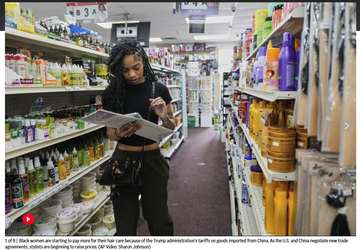

ATLANTA (AP) — Before the oppressive summer heat descends on Atlanta, therapist Brittanee Sims usually gets her thick, curly hair braided at a salon to preserve her healthy mane.
But it’s more expensive this year. So she’ll only pay for her teenage daughter and son to get their summer hairdos. Not having braided hair “creates more of a hassle for everything,” said Sims, who counts herself among the tens of millions of women that regularly spend on the Black hair care industry.
Now, she said, she has to “go home and figure out what I’m gonna do to my hair in the morning, after I went to the gym and it’s messed up with sweating and frizz.”
President Donald Trump’s tariffs are driving up prices for products many Black women consider essential, squeezing shoppers and stylists even more as they grapple with inflation and higher rents. Much of the synthetic braiding hair, human hair for extensions, wigs and weaves, styling tools, braiding gel and other products is imported from or has packaging from China, which was subject to a combined 145% tariff in April. India also is a major global source of human hair.
Related Stories
Many Black women have hair types and workplace-favored styles that require careful attention, and they can spend hundreds of dollars at salons each month on extensions, weaves, wigs and braids. The Associated Press spoke with several Black hair industry experts, beauty supply store owners, and wholesale companies, as well as nearly two dozen Black stylists and braiders, some of whom may have to raise prices even as business has slowed.
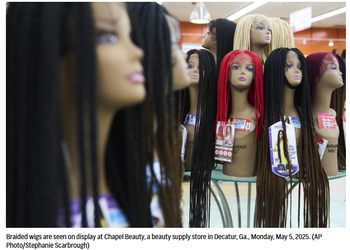
Earlier this month, the United States agreed to drop the 145% tax on goods imported from China to 30% while the two economic superpowers negotiate new trade agreements. Imports from most other countries face baseline tariff rates at 10%.
Regardless, the next few months “are already shot” for many items, said Marty Parker, a University of Georgia business professor and supply chain expert who worked in the hair care industry. The costs companies have been facing at ports are making their way down to consumers, supply shortages are getting worse, and it’s unclear what will happen if negotiations break down.
“Prices go up very fast and come down very slow,” Parker said.
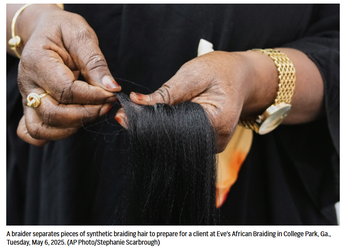
Costs go up for Atlanta stylists
Some stylists said they’re seeing fewer clients because prices are going up for virtually everything.
Atlanta stylists are paying more for hair from China. Atlanta stylist Yana Ellis, who also sells products like wigs, paid an extra $245 in shipping for 52 bundles of hair in March compared to 40 bundles in December. AaNiyah Butler said her shipping costs for human hair more than doubled from February to May. And Dajiah Blackshear found in early May that a beauty supply store raised the cost of the kind of hair she’s used for years by $100.
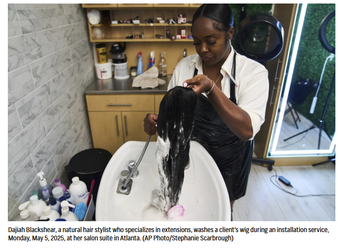
Dajiah Blackshear, a natural hair stylist who specializes in extensions, washes a client’s wig during an installation service, Monday, May 5, 2025, at her salon suite in Atlanta. (AP Photo/Stephanie Scarbrough)
The store owner said he may have to stop selling that brand of hair because it went up so much. Similarly, some wholesale hair stores have seen higher costs or are expecting them in the coming weeks. Even the typical $6 to $10 cost of a pack of synthetic hair has crept up.
Blackshear doesn’t want clients to bring hair because she likes to vet the quality. But if expenses continue to mount, she may have to raise her prices.
“It’s going to be extremely difficult,” she said, especially for clients who are “having to make those hard decisions, between ‘do I get my hair done or do I pay my bills?’”
Janice Lowe, who runs 5 Starr Salon in a lower-income neighborhood southeast of Atlanta, has started asking clients to bring hair and is unable to purchase certain products.
“I’m falling behind on my obligations,” she said.
The industry braces for uncertainty
Consultants vary on how much prices will rise, when they’ll go up and for how long — and the full harm to stylists and consumers could be months away.The global Black hair care industry was worth about $3.2 billion in 2023, according to market.us, and Black women spend six times more on hair care than other ethnicities.
Stylists often purchase some harder-to-get professional products from door-to-door distributors that buy from wholesale companies or larger distributors that purchase directly from other countries.
Lowe has seen some of her distributors vanish altogether, making it harder to get professional lines such as Black-owned leading professional hair care brand Design Essentials, manufactured in Atlanta at McBride Research Laboratories.
Design Essentials is trying to delay big price increases until 2026 or 2027, and may turn to layoffs or pause promotions to save money, said president Cornell McBride Jr. Most packaging plastics come from China, but ingredients can come from many places.
“Nobody wants to put it to the consumer but the person who pays is the consumer in the end,” McBride Jr. said.
Hawa Keita and her mother usually charge customers between $160 and $250 for braiding at their shop, Eve’s African Hair Braiding in College Park southwest of Atlanta. Keita is determined to take losses because their customers “can’t afford the Atlanta prices,” Keita said.
Hair stylist India Sands holds a pack of synthetic braiding hair that is made in China as she shops at Chapel Beauty, a beauty supply store in Decatur, Ga., Monday, May 5, 2025. (AP Photo/Stephanie Scarbrough)
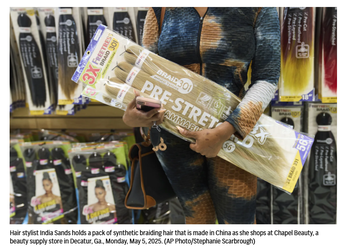
The cost of a box of 100 packs of braiding hair from China went up for the first time in two years, from $250 to $300, Keita said. They order weekly, often multiple boxes. Some companies say they’ll soon raise prices or run out of stock.
Making customers happy is ultimately what will keep the business afloat, Keita said. She smiled as she recounted braiding a young woman’s hair for her birthday with a style she suggested.
“When we finished, she gave me the biggest hug, and she was in here screaming and just yelling because she just really loved her hair,” Keita said.
Priced-out consumers face unfair beauty standards
For many Black Americans, especially women, affording their hair care also means confronting unfavorable beauty standards. Georgia State University law professor Tanya Washington said recent discoveries about dangerous chemicals in synthetic hair and hair straightening products have sparked conversations among Black women looking for hairstyles that don’t require as much imported products.Tanya Washington, a professor of law at Georgia State University, poses for a portrait in her office near a framed photo of her wearing her hair in an afro, Tuesday, May 6, 2025, in Atlanta. (AP Photo/Stephanie Scarbrough)
But embracing natural hairdos can be daunting for women like the soon-to-be lawyers and clerks Washington advises who face pressure to straighten their hair.
“That puts everyone who does not have organically, naturally derived straight hair at a disadvantage in these spaces,” she said. “I think that a definition of professionalism that favors one phenotype — European phenotype — over all others, is inappropriate.”
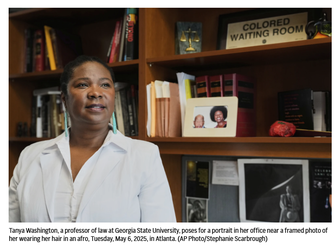
But embracing natural hairdos can be daunting for women like the soon-to-be lawyers and clerks Washington advises who face pressure to straighten their hair.
Longstanding income disparities between Black and white American women can also make higher hair care prices untenable. According to the U.S. Census, as of 2023, the median household income in Atlanta is $131,319 for white households and $47,937 for Black households.
It’s an inequality issue that professional hairstylists are aware of nationwide.
Stylist Mitzi Mitchell, owner of PIC ONE Beauty Services in Pennsylvania, said she has stocked up on certain products and tools for another year in anticipation of price increases.
She wants to avoid “bootleg” products, which are made illegally and often aren’t as safe, but became much more prevalent in the marketplace during economic downturns.
“I’m really conscientious about my Black minority clients because we make a heck of a lot less than other nationalities,” said Mitchell, who is Black. “I try to keep prices low so we can continue to have the same services, but I know I will have to raise it.”
___
Kramon is a corps member for The Associated Press/Report for America Statehouse News Initiative. Report for America is a nonprofit national service program that places journalists in local newsrooms to report on undercovered issues. Follow Kramon on X: @charlottekramon.

Kramon covers government and politics from Atlanta. She is a Report for America corps member.
(+)
